|
SONGS & POEMS
The Shamrock is the Pride of an Irishman's Heart
J. Kelly, 258 Westmuir Street, Parkhead, writes:-
"I notice that 'Stoker' is asking for a song which was written by me, and I
have pleasure in sending it for 'Weekly News.'"
There's a grand old custom prevails in our land, 'Tis to give to the
stranger a grasp of the hand;
To look in his face, and exclaim with a smile - Your welcome, dear friend,
to our Emerald Isle.
We ask not your creed, we ask not your name, Whether wealthy or poor, to us
your the same,
If your honest and true, and play well your part, You'll still find a place
in an Irishman's heart.
CHORUS
A Yankee with the violet, will decorate his breast, An Englishman will tell
you, that he loves the rose the best,
The Scotsman wears the thistle, and with it will not part, But the Shamrock
is the pride, of an Irishman's heart.
Let me go where I will, this world ramble o'er, There are few lands so fair,
as my own native shore;
'Tis said that the angels, whilst floating through space, Oft stop, gaze,
and wonder at so beauteous a place.
There's our lakes and our mountains and valley so green, Nothing grander not
richer have their eyes ever seen;
Much longer they'd linger, perhaps ne'er depart, If they once felt the love
in an Irishman's heart.
CHORUS
The sons of old Ireland, are valiant and bold, And oft have their praises in
history been told;
The daughters of Erin, are tender and true, Bright models of virtue,
enchanting to view.
'Tis no wonder we're proud, of an island that grows, So sacred an emblem,
loved even by foes,
As the green little shamrock, unrivalled by art, And dearer than life to an
Irishman's heart
JUST FOLKS by Edgar A. Guest
The Pansy
There's something in a pansy's face, So touched with beauty and with
grace,
So soft with lovely pity, I, Can never heedless pass it by.
The richer roses lure me on, With countless charms to look upon,
They seem to say with scornful pride: "Why for such weaklings turn aside?
Why waste your time with such as they? We are the
fashion of the day!
Look, we are roses! Yet you stand, and hold a pansy in your hand!"
Oh, richer rose, with all your pride, Something to you has been denied;
This humble pansy seems to be, More like my own good friends and me.
I seem to know how hard it tries, To come to favour in
men's eyes,
And in its beauty I can find, Soft traces of a gentle mind.
'Tis an old friend who has stayed poor, while his neighbours progress made,
And though I know the roses, I - For old times sake, won't pass it by.
Flowers are like men, The proud disdain, Those who in
humbless remain,
Yet in the lowly pansy glows, A soul as lovely as the rose.
"I'm hungry, Ma!"
That is what the youngsters say: "I'm hungry, Ma!" Hear it forty times a
day: "I'm hungry, Ma!"
Breakfast over, in by nine, Come those healthy tykes of mine, With this most
appealing whine: "I'm hungry, Ma!"
Meals can't stop this common cry: "I'm hungry, Ma!" Stuff them full, and
still they sigh: "I'm hungry, Ma!"
Scarcely seems the dinner done, When into the house they run, Two, that
loudly shout as one: "I'm hungry, Ma!"
Feed them cookies. Still they wail: "I'm hungry, Ma!" Here's a plea that
cannot fail: "I'm hungry, Ma!"
Age, with appetites worn out, Stands aghast and seems to doubt, Such a
modest incessant shout: "I'm hungry, Ma!"
Hear it when they start for bed: "I'm hungry, Ma!" Last thought of each
drowsy head: "I'm hungry, Ma!"
And I chuckle soft and low, As I hear it, for I know, Once I shouted long
ago: "I'm hungry, Ma!"
Hope to hear it, till I die: "I'm hungry, Ma!" There's no lovelier call or
cry: "I'm hungry, Ma!"
Glad the spot where day by day, Healthy youngsters romp and play, Often come
home to say: "I'm hungry, Ma!"
Sing a Song
If you'll sing a song as you go along, In the face of a real or fancied
wrong;
If, in spite of the doubt, you will fight it out, And show a heart that is
brave and stout;
If you'll laugh at the jeers and refuse the tears, You'll force the ever
reluctant cheers,
That the world denies when a coward cries, But gives to the man who bravely
tries,-
And you'll win success with a little song, If you'll sing the song as you go
along.
If you'll sing a song as you go along, You'll find that the singing will
make you strong,
And the heavy load and the rugged road, And the sting and the strife of the
tortuous good,
will soar with the note that you set afloat, That the beam will change to a
trifling mote,-
That the world is sad when you are sad, And bright and beautiful when you
are glad;
And that all you need is a little song, If you'll sing the song as you
trudge along
The Face on the Bar Room Floor
Copyright by W. H. Fawset *Billy Wizz Bang
'Twas a balmy summer evening and a goodly crowd was there,
Which well nigh filled Joe's bar-room on the corner of the square,
And as songs and witty stories came through the open door,
A vagabond crept slowly in and posed upon the floor.
"Where did it come from?" some one said. "The wind has blown it in."
"What does it want?" another cried, "some whiskey, rum or gin?"
"Here, Toby, seek him, if your stomach's equal to the work -
I wouldn't touch him with a fork, he's as filthy as a Turk". (sorry)
This badinage the poor wretch took with stoical good grace;
In fact he smiled as though he thought he'd struck the proper place.
"Come boys, I know there's kindly hearts among so good a crowd -
To be in such good company would make a deacon proud.
Give me a drink - that's what I want - I'm out of funds, you know,
When I had cash to treat the gang, this hand was never slow.
What! You laugh as if you thought this pocket never held a sou,
I once was fixed as well, my boys, as any one of you.
"There, thanks,
that's braced me nicely; God bless you one and all;
Next time I pass this good saloon, I'll make another call.
Give you a song? No, I can't do that, my singing days are past,
My voice is cracked, my throat's worn out, and my lungs are going fast.
"Say, Give me another whiskey, and I'll tell you what I'll do -
I'll tell you a funny story, and a fact, I promise, too.
That I was ever a decent man not one of you would think;
But I was, some four or five years back. Say, give me another drink.
"Fill her up, Joe, I want to put some life into my frame -
Such little drinks to a bum like me are miserably tame;
Five fingers - there, that's the scheme - and corking whiskey, too.
Well, here's luck, boys, and landlord, my best regards to you.
"You've treated me pretty kindly, and I'd like to tell you how,
I came to be the dirty sot you see before you now.
As I told you, once I was a man, with muscle, frame, and health,
And, but for a blunder, ought to have made considerable wealth.
"I was a painter - not one that daubed on bricks and wood,
But an artist, and for my age, was rated pretty good;
I worked hard at my canvas and was bidding fair to rise,
For gradually I saw the star of fame before my eyes.
"I made a picture perhaps you've seen, 'tis called the 'Chase of Fame,'
It brought me fifteen hundred pounds, and added to my name.
And then I met a woman - now comes the funny part -
With eyes that petrified my brain and sunk into my heart.
"Why don't you laugh? 'Tis funny that the vagabond you see,
Could ever love a woman and expect her love for me;
But 'twas so, and for a month or two her smiles were freely given,
And when her loving lips touched mine, it carried me to heaven.
"Boys, did you ever see a girl for whom your soul you'd give,
With a form like the Milo Venus, too beautiful to live;
With eyes that would beat the Koh-i-noor, and a wealth of chestnut hair?
If so, 'twas she, for there never was another half so fair.
"I was working on a portrait, one afternoon in May,
Of a fair-haired boy, a friend of mine, who lived across the way;
And Madeline admired it, and much to my surprise,
Said that she'd like to know the man that had such dreamy eyes.
"It didn't take long to know him, and before the month had flown,
My friend had stolen my darling, and I was left alone;
And ere a year of misery had passed above my head,
The jewel I had treasured so had tarnished and was dead.
"That's why I took to drink, boys. Why, I never saw you smile;
I thought you'd be amused and laughing all the while.
Why, what's the matter, friend; there's a teardrop in your eye?
Come, laugh like me; 'tis only babes and women that should cry.
"Say, boys, if you give me just another whiskey, I'll be glad,
And I'll draw right here, a picture of the face that drove me mad.
Give me that piece of chalk with which you mark the baseball score -
You
shall see the lovely Madeline upon the bar-room floor."
Another drink, and with chalk in hand, the vagabond began,
To sketch a face that well might buy the soul of any man.
Then, as he placed another lock upon the shapely head,
With a fearful shriek he leaped and fell across the picture, dead.
Guest's Daily Verse
Richer Than Before
We've had our share of sorrows, And we've had our time of fear,
We have waked to sad tomorrows, But we've lived another year;
And is spite of all the grieving, And the burdens that we bore,
The old year's truly leaving, Us all richer than before.
We are wiser now and kinder, Than we were when it
began,
We are just a little blinder, To the petty faults of man;
And when days of trouble found us, Sending sorrow to our door,
To the friends who gathered round us, We are closer than before.
To the old and tried and true friend, With the passing
of the year,
Came a good and happy new friend, With his comfort and his cheer;
Though out fortune doesn't show it, As we run our bank book o'er,
In many ways we know it - We are richer than before.
We have memories to treasure, All unknown a year ago,
Little sparkling gems of pleasure, Which forever we may know;
At the end of December, With the twelve months almost o'er,
We have much we shall remember, And we're richer than before.
Copyright, 1922, by Edgar A. Guest
The New Virtue by Arthur Kidd
Though I've grown much too worldly to swallow, The precepts dished up in
my youth,
And confess I've neglected to follow, The track of sheer wisdom and truth;
If the deuce proves too lively to lay low, And I can't see myself when I'm
dead,
Done in glass, so-to-speak, with a halo Surrounding my head;
Though such virtues I boast be but minor, And, I fear, of the negative kind;
If I've never been known as a whiner, Nor tottered home totally "blind";
Ne'er in gambling attempted one flutter, Nor shown myself yet as a sham,
Nor indulged in wild talk, save to mutter, A casual damn.
Yet to-day I feel more than heroic; As "necessities" soar to the skies,
I stick up for myself as a stoic, Even Zeno would hardly despise,
For while mercies no more on me shower, But leave me as dry as a drout,
I've developed that marvellous power, Of "doing without."
the following are all by Edgar A. Guest
Handsome
I've been south where the palm tree sway, And the sea and the sky are blue,
Even though home was a thousand miles away, Still haunted me through and
through.
I've stretched full length on this golden sand, And I've dreamed in a lovely
spot,
But that I was afar in a foreign land, Was something I never forgot.
A mocking bird whistled and called to me, And begged
me to share his cheer,
But always a small voice said to me; "The ones that you miss aren't here.
You'd better get back where the trees are bare, For you never were fashioned
to roam,
It's cold in the north, but your friends are there," So I packed up my stuff
and went home.
Traveling by Edgar A. Guest
When you want to make a trip, Any motor club will hand you,
Printed nicely on a slip, Routes which at your town will land you,
Dangerous curves will all be shown; Paved and gravel roads made known;
Where are workmen still employed; Just what stretches to avoid:
Everything before you've started, For your guidance will be charted,
And they'll tell you as they show it; "We have made the trip and know it,
Here's the best way, Don't forsake it, Follow this road and you'll make it."
"What's the way to reach the top?" Asks a youth at
life's beginning,
Age has had so many stop, Seeking what is worth the winning,
That it has a printed slip, Charting such a dangerous trip,
"Keep the narrow road ahead, Watch the curves and use your head,
Do whatever duty asks, Give your best to all your tasks,
Never for one minute think, You are strong enough to drink,
If you stop too long to play, You are apt to lose the way."
"Keep your name and record clear, Never cheat and
never lie,
Follow the road, year by year, And you'll get there by and by"
Age has made the trip and gravely, Tells the youth to journey bravely,
But he wonders later on, When the happy-heart has gone,
If the lad has kept the known way, Or has turned to go his own way,
Many seem to fear the long way, So they venture on the wrong way,
And they finish, worn and tired, In the ruts forever mired.
Dreaming by Edgar A. Guest
Half the fun is dreaming, Half is keeping on, Planning for and scheming,
Till the thing is done;
But when you've achieved it, Dull and cold it seems, Not as you perceived
it, In your golden dreams.
What is done is ended, You need hope no more, That which seemed so splendid,
In the days before,
Lies a task completed, Commonplace to view, Just a foe defeated, Now there's
more to do.
Joy is in the dreaming, Doing holds the thrill; Dull
the time is seeming, While you're standing still.
Pried of conquest stifles, All the future fun, Goals achieved are trifles,
Greater must be won.
Dark although the day be, Joy lies in the doubt, Hope is in the may be, You
can work things out,
But the thrill is over, When the fight is won, And you must discover, New
goals farther on.
Youth by Edgar A. Guest
If youth had been willing to listen, To all that its grandfathers told,
If the gray-bearded sage by the weight of his age, Had been able attended to
hold,
We'd be reading by candles and heating with wood, And where we were then
we'd have certainly stood.
If youth had been willing to listen, To the warnings
and hints of the wise,
Had it taken as true all the best which they knew, And believed that no
higher we'd rise,
The windows of sick rooms would still be kept shut, And we'd still use a
cobweb to bandage a cut.
If youth had been willing to listen, Had it clung to
the best of the past,
With oxen right now we'd be struggling to plough, And thinking a horse
travels fast,
We'd have stood where we were beyond question or doubt, If some pestilent
germ hadn't wiped us all out.
So although I am gray at the temples, And settled and
fixed in my ways,
I wouldn't hold youth to the limits of truth, That I learned in my brief
yesterdays,
And I say to myself as they come and they go; "Those kids may find something
this age doesn't know."
Complaint by Edgar A. Guest
Through one and twenty years of all, That tinctures married life,
The honey sweet, the bitter gall, We've lived as man and wife.
Yet thinking of my lovely Nell, My fate I think is queer,
The things to eat I love so well, Aren't served me once a year.
Mine is a trivial complaint, Peculiarly male,
I am no white-embroidered saint, I seek no Holy grail.
But waffles and the maple sap, Are my particular dish,
Why should I be the luckless chap, Who never gets his wish?
Why should that lovely wife of mine, So stubborn be
with me,
And never suit my whim to dine, On waffles, jam and tea?
I bought an iron years ago, A shiny thing and bright,
But still the syrup doesn't flow, and waffles aren't in sight.
Ah me, the fate of man is sad, Which no one can deny,
That which would make his spirit glad, His wife disdains to try,
I order waffles in the town, And waffles when we roam,
But waffles, crisp and golden brown, I never get at home.
The House by the Side of the Road - (R. B. J.)
Sam Walter Foss who wrote this poem you ask for is also the author of
"An Art critic," "The Auctioneer's Gift," "The Little Boy Who
Went Away," "O'Flaherty and John Stubbs," "The Song of Dewey's
Guns," "The Volunteer Organist," and a number of others.
There are hermit souls that live withdrawn, In the place of their
self-content;
There are souls like stars that dwelt apart, In a fellowless firmament;
There are pioneer souls that blaze their paths, Where highways never ran -
But let me live by the side of the road, And be a friend to man.
Let me live in a house by the side of the road, Where the race of men go by
-
The men who are good and the men who are bad, As good and as bad as I,
I would not sit in the scorner's seat, Or hurl the cynic's ban -
Let me live in a house by the side of the road, And be a friend to man.
I see from my house by the side of the road, By the side of the highway of
life,
The men who press with the ardor of love, The men who are faint with the
strife,
But I turn not away from their smiles nor their tears, Both parts of an
infinite plan -
Let me live in a house by the side of the road, And be a friend to man.
I know there are brook-gladdened meadows ahead, And mountains of wearisome
height,
That the road passes on through the long afternoon, And stretches away to
the night,
And still I rejoice when the travellers rejoice, And weep with the strangers
that moan,
Nor live in my house by the side of the road, Like a man who dwells alone.
Let me live in my house by the side of the road, Where the race of men go by
-
They are good, they are bad, they are weak, they are strong, Wise, foolish -
so am I,
Then why should I sit in the scorner's seat, Or hurl the cynic's ban,
Let me live in my house by the side of the road, And be a friend to man.
"Do It Today" (Mrs. H. M.)
The poem you ask for it one of the dear little effusions presented to
our readers for so many years by the late Will P. Snyder, of Ashland, Pa.
There's a careworn look on mother's brow, Kiss it away today;
Don't wait till it's gone, but do it now, Do it today, I say.
There's much she's done the long day through,
Did what she thought was best for you, Did what all loving mothers do
Did it for you today.
There's a tear-drop falling from mother's eye, Wipe it away today;
Don't wait till the clouds pass from her sky, Wipe it away, I say,
Many's the thankless task she's done
Labored because her careless one, Left unfinished some work begun,
Did it for you today.
Think of the days and the months and the years, Think of them bow, today,
When she kissed away your childish fears, Think of them now, I say,
Think how she bore you in her arms,
Hushed you to sleep 'mid night's alarms, Loved you with all your baby
charms,
Think of all this today.
There's much you owe her and ought to pay, Pay what you can today,
Pay it with kindness now, while you may, Do what you can, I say,
Pay her with love you still may show,
Do what you can - she loves you so, Walk in the paths she'd have you go,
Begin, right now, today.
Man by Douglas Malloch
In the beginning, God made the world, and set it spinning; And, in good
season, For God's good reason,
(The hardest thing I find, my friend, To comprehend, In all God's plan)
Made Man.
Thus to the spinning planet clung, When life was young, This creature filled
with creature wonder,
Who thought things out - or did he blunder? -
Found fire and food, and bad and good, and wealth to win, and new varieties
of sin.
And down the ages so he comes, With weaker thumbs, And nimbler fingers, and
still he lingers,
And points with pride and speaks with ease,
Of Man and other mysteries, Speaks even with a shrug or nod, Of God.
Much has he fashioned, learned and found, Since first he grovelled on the
ground;
Yet let me ask him (if the small, the great may question), after all,
Of strength and power, Of gem and flower, What has he found not on the
sphere,
Ere Man was here.
The Lightning - it is very new? The waves in ether - was it you - That put
them there?
And show me where, In gardens Man-made roses bloom, To light the gloom,
In all your art do you create, Or imitate?
"Ah, yes," Man cried, "but it is I - Who harnessed water, earth and sky,
Spanned space, sailed seas, Built roofs from trees! Look all around you! -
you will find,
The triumphs of the Human Mind!" Oh, by the mind these things were done?
Who gave you one?
"The Coortin O' Bella McFall"
I went a coortin' big Bella McFall, Two years ago, an a month in all,
I'm five feet wee an' she's six feet tall, An growin' week by week.
A night ago I hitched up my pants, Says I, to myself, now here's your
chance,
To ask her jist for to kiss you wance, You're destiny to seek.
The rain came on an' it wouldn't stop, We sheltered in Riley's blacksmiths
shop,
An' blathered a while o' the Pirtie crop, There wasn't a one in sight.
I said I'd pigs an' a wheen o' fowl, But Divil the kiss would she give a
scowl,
I began to think she was far too cowl? When she murmured "Ach, I might"
"But shure," she says "someone else might see, An' then again you are far
too wee"
Says I "will ya leave the job to me?" She answered me by noddin!
So right on top o' the anvil I stud, An' gave her a kiss as a fella shud,
"Yer nose" says I, s'like a nice wee spud" Says she "ach quit your coddin"
We dandered on along the road, A couple o' miles afore we knowed,
Twas me was burdened down wi' a load, The worse for manys a day.
"I'll just take a kiss like the one I got" I says, an' she answered "deed
yil not"
Says I "well there's no use carrying that"! So I threw the anvil away.
We thrashed it out as we prowled along, Twas plain to see there was
something wrong,
The way we tackled 'Loves own sweet song' Somehow was not befittin.
"Sit down" I says "till we get this right, An' we hadn't sat long till I saw
the light,
So I bring her to this place every night, An kiss her while she's sittin'.
A Edgar A. Guest
New Day Edgar A. Guest
The days are all so new, Fresh joy or sorrow, Dreams broken or come
true, Mark each tomorrow
Never a day is cast, Just like those past.
Tired though I seem to be, Wearied by things, Still I
would live to see, What this day brings,
What, though long years have flown, This day I've never known.
Life is an endless play, Brightened with jest, Some of
its scenes are gay, Radiantly dressed;
But there are hours when we - Witness its tragedy.
What shall I see today? What tale be told? Who knows
what minute gay, Time shall unfold?
Eyes wide I go to view, Strange things and new.
Money Matters Edgar A. Guest
This tale I write is neither new nor is it passing strange,
'Tis but a tale of woman's wile, which Time will never change;
My Nellie, she is wondrous fair, and most devout is she,
But still in money matters she delights in cheating me.
She would not do one shameful deed, she would not
steal or lie,
The store man gladly trust her for what'er she cares to buy;
With him her word is good as gold, no bond could stronger be,
But when it comes to money, she's a downright fraud with me.
I, as her husband, seem to be beyond the laws of
trade,
I should not when I lend to her, expect to be repaid;
Nor should I hold her to her word, "I'd be a brute," she cries,
To charge her for the groceries my personal pocket buys."
And does she borrow five or ten to serve some present
lack,
She would be hurt most grievously if asked to pay it back,
But let me borrow "five" from her, no rest she'd let me know,
She'll wake me in the dead of night to speak of what I owe.
And yet I chuckle at her wiles and smile to hear her
plead,
For after all one common purse will serve our every need,
She knows and I know well enough, what'er the case may be,
That when it comes to money she can coax it out of me.
Time Edgar A. Guest
The clock strikes and another hour begins, Time's army marches by in
single file,
Seemingly heedless of our virtues, sins, The frown of man or woman's lovely
smile,
And none so wise, so rich, or so distraught, As this brief hour to lengthen
or cut short.
'Tis ten o'clock, in sixty minutes more, Eleven will
ring upon the morning air,
As calm and certain as the hour before, Unchanged by laughter or unmoved by
care;
Not one in all that endless line of hours, Will pause or hurry for some whim
of ours.
Sunrise and sunset, generals of the day, Man cannot
bribe or threaten or control;
Storm nor disaster, nor despair, can stay, Or change one second of the
mighty whole,
Times will press on though nations rise or fall, The passing hour is master
of us all.
Homeland Goodbye
Kindly sent by J. McRory, Cambusland, to "M.M."
Farewell, sweet land of Erin, beautiful isle of the sea,
No matter where I wander deep in my heart you'll be,
Over the broad Atlantic I sail from Queenstown to-day,
But I'm finding it hard for to leave you, and feel mighty sad when I say -
CHORUS -
Homeland, homeland, when shall I see you again?
Land of my birth, dearest place on earth,
I'm leaving you, and recall the old song with a sigh,
It may be for years and it may be for ever,
Dear homeland, goodbye.
Good luck may come my way, over the ocean somewhere;
Shure, won't the boys be talkin' when I'm a millionaire,
Though I may own a mansion still I'll be thinkin' always,
Of that dear old mud cabin in Ireland where I spent my happiest days.
CHORUS
When from the land I'm sailing, there on the docks I shall be,
Watching the dear old homeland fading away from me,
Two Irish eyes will glisten, one loving heart too will yearn,
Oh, Mavourneen, I'm hoping that some day to you, my sweetheart, I'll return.
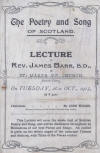


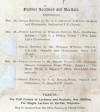
The Poetry and Song of Scotland
Lecture by Rev. James Barr, B.D., in St. Mary's U.F. Church, Govan
Cross, on Tuesday, 26th October 1915 - Chairman, Mr. John Wilson
This Lecture will cover the whole field of Scottish Poetry and Song, and
will be illustrated throughout by Recitations of our best Poems and Songs.
An outline is given on the within pages of the principal Themes and Authors,
with Titles of the Pieces recited.
I. - Poems of Childhood and Youth
Alexander Anderson, 1845-1909 "A' His Lane," "Cuddle
Doon"
James Ballantine, 1808-1877 "Castles in the Air"
Henry Scott Riddell, 1798-1870 "Our Mary"
George James Lawrie, 1797-1878 "Lang, Lang Syne"
John Stuart Blackie, 1809-1895 "The Wee Herd Laddie"
Charles Murray ---- "The Whistle"
II. - Poems of the Home
Robert Ferguson, 1750-1774 "The Farmer's Ingle"
Robert Burns, 1759-1796 "The Cottar's Saturday Night"
James Montgomery, 1771-1854 "Home"
III. - Songs of Love
A. The Hyperbole of Love :-
Allan Ramsay, 1686-1757 "Lochaber no More"
Robert Burns, 1759-1796 "A Red, Red Rose"
B. The Constancy of Love :-
William Douglas, 17th Century "Annie Laurie"
Robert Tannahill, 1774-1810 "Loudoun's Bonnie Woods and
Braes"
How ladies of taste object to have Poems made upon them!
C. The Democracy of Love :-
Allan Ramsay, 1686-1757 "The Lass o' Patie's Mill"
Robert Burns, 1759-1796 "Galla Water" "Tam Glen"
Robert Tannahill, 1774-1810 "Jessie, the Flower o'
Dunblane"
D. The Humour of Love :-
Allan Ramsay, 1686-1757 "Bessie Bell and Mary Gray"
Caroline Baroness Nairne, 1766-1845 The Laird o' Cockpen"
E. The Tragedy of Love :-
Robert Burns, 1759-1796 "Open the Door to Me"
John Mayne, 1759-1836 "Helen of Kirkconnel"
Thomas Campbell, 1777-1844 "Lord Ullin's Daughter"
IV. - Songs of Country
A. The Days of the Vikings :-
John Stuart Blackie, 1809-1895 "The Death of Haco"
B. The Wars of Independence :-
Henry, the Minstrel, 15th Century "Acts and Deeds of the
Illustrious and Valiant Champion, William Wallace, Knight"
John Barbour, 1316-1395 "The Acts and Life of the most
Victorious Conqueror, Robert Bruce, Champion of Scotland"
Robert Tannahill, 1774-1810 "The Lament of Wallace after
the Battle of Falkirk"
Felicia Dorothea Hemans, 1793-1835 "Surrendering the Crown
to Bruce"
James Hogg, 1770-1835 "Surrendering the Crown to Bruce"
Thomas Campbell, 1777-1844 "The Dirge of Wallace"
C. Flodden Fiefd :- (Field)
Alison Rutherford Cockburn, 1713-1795 "The Flowers of the
Forest"
Jean Elliot, 1727-1805 "The Flowers of the Forest"
D. The Covenants :-
Robert Allan, 1774-1841 "The Covenanter's Lament"
Allan Cunningham, 1784-1842 "The Discomfiture of the
Godless at Drumclog"
James Hyslop, 1798-1827 "The Cameronian Dream"
Marion Paul Aird "The Martyr Graves"
Mrs. A. Stuart Menteath "Peden at the Grave of Cameron"
James Dodds "Lays of the Covenanters"
John Stuart Blackie, 1809-1895 "The Song of Mrs. Jenny
Geddes"
E. Glencoe :-
Mary Maxwell Campbell "Lament for Glencoe
F. The Jacobite Risings :-
William Glen, 1789-1826 "Waes me for Prince Charlie"
James Hogg, 1770-1835 "Bonnie Prince Charlie" "Flora
MacDonald's Lament"
Carolina Baroness Nairne, 1766-1845 "Wha'll be King but
Charlie?" "Charlie is my Darling" "Will ye no come back again?"
Henry Scott Riddell, 1798-1870 "Flora's Lament"
William Edmonstone Aytoun, 1813-1865 "The Old Scottish
Cavalier"
G. General Patriotism :-
Sir Walter Scott, 1771-1832 "Breathes there a Man"
James Hogg, 1770-1835 "Caledonia"
Thomas Pringle, 1789-1834 "The Emigrant's Farewell"
Robert Gilfillan, 1798-1850 "The Exile's Song"
Henry Scott Riddell, 1798-1870 "Scotland Yet" "The
Land of Gallant Hearts"
V. - Songs of the Sea
James Thomson, 1700-1748 "Rule Britannia"
Thomas Campbell, 1777-1844 "Ye Mariners of England"
Allan Cunningham, 1784-1842 "A Wet Sheet and a Flowing
Sea"
Thomas Gordon Torry Anderson, 1805-1856 "I Love the Sea"
VI. Poems of Nature
James Thomson, 1700-1748 "The Seasons"
Michael Bruce, 1746-1767 "Ode to the Cuckoo"
VII. Poems of Religion
Robert Blair, 1699-1746 "The Grave"
James Grahame, 1765-1811 "The Sabbath"
John Struthers, 1776-1853 "The Poor Man's Sabbath"
James Hyslop, 1798-1827 "The Scottish Sacramental Sabbath"
Robert Pollok, 1798-1827 "The Course of Time"
James Ballantine, 1808-1877 "Ilka Blade o' Grass keps its
ain drap o' Dew"
David Gray, 1838-1861 "The Golden Wedding" "A Poet's
Epitaph"
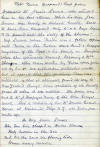



Robt. Burns (Supposed) last poem
Dedicated to Jessie Lewars, who attended him in his last illness.
While his wife Jean Armour was herself in delicate health. Said to
have been composed only 5 or 6 days before R.B. passed into the 'Valley of
the Shadow' Miss Lewars whose Brother was a fellow official with Burns
in the Excise was a kind & helpful neighbour of the Poet & his family in
Dumfries, where she afterwards married, becoming a Mrs. Thomson, other
verses written by Burns were given over by her & are included in published
works, but it appears that this particular poem was withheld & that it
ultimately found its way to New Zealand through some relative of the kindly
person to whom it was indited. The poem was sent to Mr. J. Macgregor
Murry of the Clan Gregor Society, thru' a relative of his - Mr. Donald
Grant, Farmer at Waikoniti, Otago, N.Z. who died a few months ago.
Scottish Events



 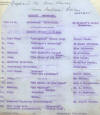
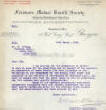   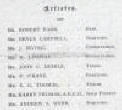
1
2
3
4
5
1) Glasgow Music Festival (Irvine)
2) Glasgow Festival 1920
3) Glasgow Musical Festival
4) Copland Road U.F. Church Ex0Service Members Entertained x 2
5) 1921 to Mr. J. Irving (Irvine) Plating Dept., South Yard, Ardrossan from
Foreman's Mutual Benefit Society
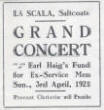   


1
2
3
1) La Scala, Saltcoats 1921 Earl Haig's Fund for Ex-Service Men x 4
2) Annual Social at Ardrossan, Saltcoats Literary Society
3) 1924 A Scottish Soiree, Concert and Sketch
  
The Old Curiosity Shop in aid of the Children's Home Hospital, Strathblane
1921 x 3
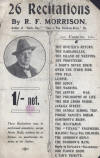
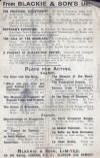

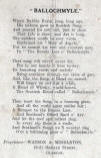
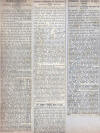
26 Recitations by R. F. Morrison
Saltcoats 1931? |




























